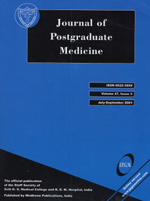
|
Journal of Postgraduate Medicine
Medknow Publications and Staff Society of Seth GS Medical College and KEM Hospital, Mumbai, India
ISSN: 0022-3859
EISSN: 0022-3859
Vol. 50, No. 4, 2004, pp. 247-251
|
 Bioline Code: jp04084
Bioline Code: jp04084
Full paper language: English
Document type: Research Article
Document available free of charge
|
|
|
Journal of Postgraduate Medicine, Vol. 50, No. 4, 2004, pp. 247-251
| en |
A matched case-control study of risk factors for neonatal tetanus in Karachi, Pakistan
Raza SyedAhsan, Akhtar S, Avan BI, Hamza H, Rahbar MH
Abstract
Background:
Previous studies have identified various risk factors for neonatal tetanus (NNT) in rural areas of Pakistan. The present matched case control study was conducted to further evaluate these risk factors in an urban setting.
Aim:
The study was carried out to identify risk factors for NNT in Karachi.
Materials and Methods:
Patients of NNT (n = 125) diagnosed from January 1998 to February 2001 were recruited through a surveillance system of Expanded Programme on Immunization (EPI). Two neighbourhood controls (n = 250) were matched for each case for gender and date of birth of the case.
Statistical Analysis:
Conditional logistic regression was performed to assess the independent effect of factors associated with NNT.
Results:
The final multivariable model identified subsequent application of substances on the umbilical cord (adjusted matched odds ratio [adj. mOR] = 5.1 [2.7-9.7]), home delivery (adj. mOR = 1.8; 95% CI: 1.1- 3.1) and illiterate mother (adj. mOR = 1.6; 95% CI: 1.0- 2.0) as risk factors for NNT after adjusting for other variables in the model. Population attributable risk per cent (PAR %) for subsequent cord application was 69% and PAR % for home delivery was 31%.
Conclusion:
Health planners, while formulating control strategies through immunization programmes should also take into account the impact of post-delivery practices, such as 'subsequent cord application' along with pre-delivery practices. Health awareness regarding appropriate post-delivery practices should be promoted and counselling of pregnant women for giving preference to health care setting for delivery is also crucial.
Keywords
Neonatal tetanus, Risk factors, Case-control study, Multivariate analysis, Pakistan
|
| |
© Copyright 2004 Journal of Postgraduate Medicine.
Alternative site location: http://www.jpgmonline.com
|
|
